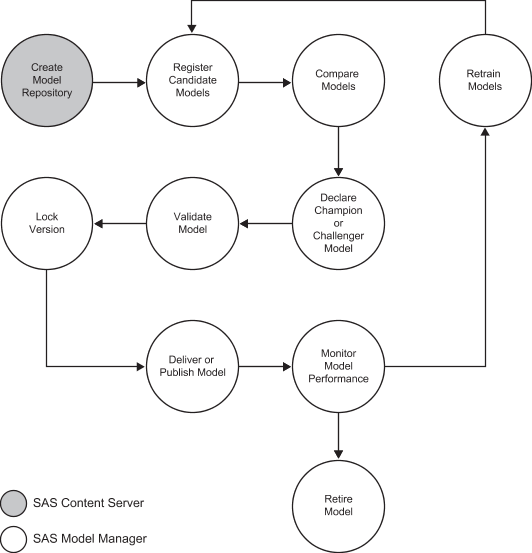Model Management Process
The following diagram
illustrates the model management process:
Here is a summary of
the model management process:
-
Create Model Repository: create a secure model repository on the SAS Content Server where SAS code, input and output files, and metadata that is associated with a model can be stored.
-
Register Candidate Models: register input and output files, and then import and configure a model.
-
Compare Models: perform scoring tests and create comparison reports for the models by using test data sources.
-
Declare Champion or Challenger Model: declare the model as champion or challenger to use for testing and production phases of the workflow.
-
Validate Model: perform scoring tests and create validation reports for the champion model and challenger models by using test data sources.
-
Lock Version: lock a version when the champion model is approved for production.
-
Deliver or Publish Model: publish a champion or challenger models to a SAS publish channel, to a database, or to the SAS Metadata Repository.
-
Monitor Model Performance: provide comparative model performance benchmarking.
-
Retrain Models: select models to retrain in response to data or market changes.
-
Retire Model: retire a model from production.
Here is an example of
the model management process for comparing a challenger model to the
champion model to determine the best champion model:
-
Register candidate models in the version that is under development.
-
Create a Dynamic Lift report and compare the model to the champion model. Flag the model as a challenger based on the results of the Dynamic Lift report.
-
Perform scoring tests with the champion and challenger models in real time or in batch. This step can be performed outside SAS Model Manager.
-
Publish the challenger model to a database or to the SAS Metadata Repository.
-
Prepare performance data sources, which include both the actual outcome variable and predicted variable.
-
Create and execute the performance monitoring for the champion and challenger models to create reports to compare and validate the champion model and challenger models. One of the reports that is available for this comparison is the Champion and Challenger Performance report.
-
Set the challenger model as the project champion if the challenger is good enough to be promoted. Go to step 3, or consider building another model as a challenger with existing or a new input training data source.
-
Publish the new project champion model with or without a new challenger model.
Copyright © SAS Institute Inc. All rights reserved.
